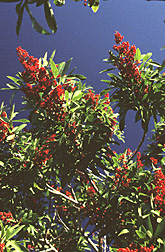This page has been archived and is being provided for reference purposes only. The page is no longer being updated, and therefore, links on the page may be invalid.
|
|
Longer Marketing Time Increases the Risk of Naturalization by Horticultural Plants
By Stephanie YaoFebruary 24, 2009
Plants that are mainstays of horticulture also carry lots of risk, a new Agricultural Research Service (ARS) study has found. Naturalization rates of non-native horticultural plants increase the longer a plant is grown and sold.
Non-native horticultural plants, including most edible and landscape plants, bring enormous benefit to the United States, but they are also a source of invasive plants that harm our natural environments. Naturalized horticultural plants are non-native plants that escape gardens and farms and are able to survive independent of cultivation. Invasive plants are naturalized species that invade natural areas, displace native plants and alter ecosystem functions.
Entomologist Bob Pemberton, with the ARS Invasive Plant Research Laboratory in Ft. Lauderdale, Fla., and his colleague Hong Liu, formerly with the University of Florida, analyzed a unique set of data from the detailed sales catalogs of an early Florida plant nursery to detect naturalization patterns of horticultural plants in the state. The data, which starts from the year 1887, accounts for more than 40 years of plant sales and examines more than 1,900 horticultural plants.
Unlike previous studies on the invasiveness of horticultural plants, the research team found that the marketing period--the number of years a plant was sold--has profound influence on naturalization and invasion. Seventy percent of plants sold in Florida for 30 years or longer naturalized, according to Pemberton, indicating that length of time sold is the most important factor contributing to naturalization.
Non-native plants will continue to naturalize and invade as long as they are sold. Therefore, according to Pemberton, risk assessments need to be developed for screening non-native horticultural plants to identify non-invasive forms and less-invasive alternatives.
Details of this study were recently published in the scientific journal Ecology.
ARS is the principal intramural scientific research agency of the U.S. Department of Agriculture.

